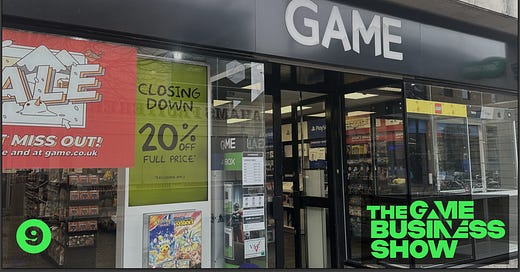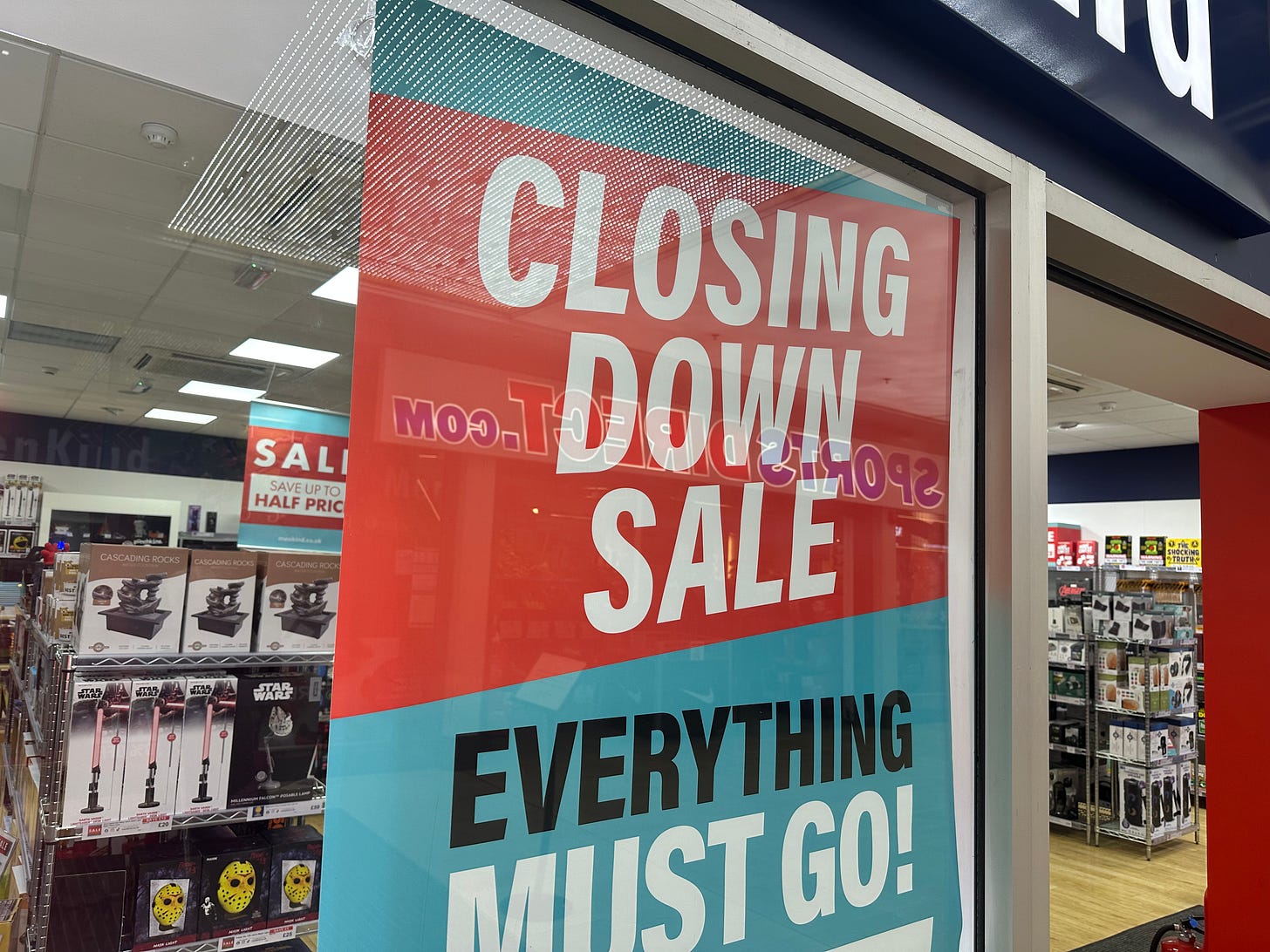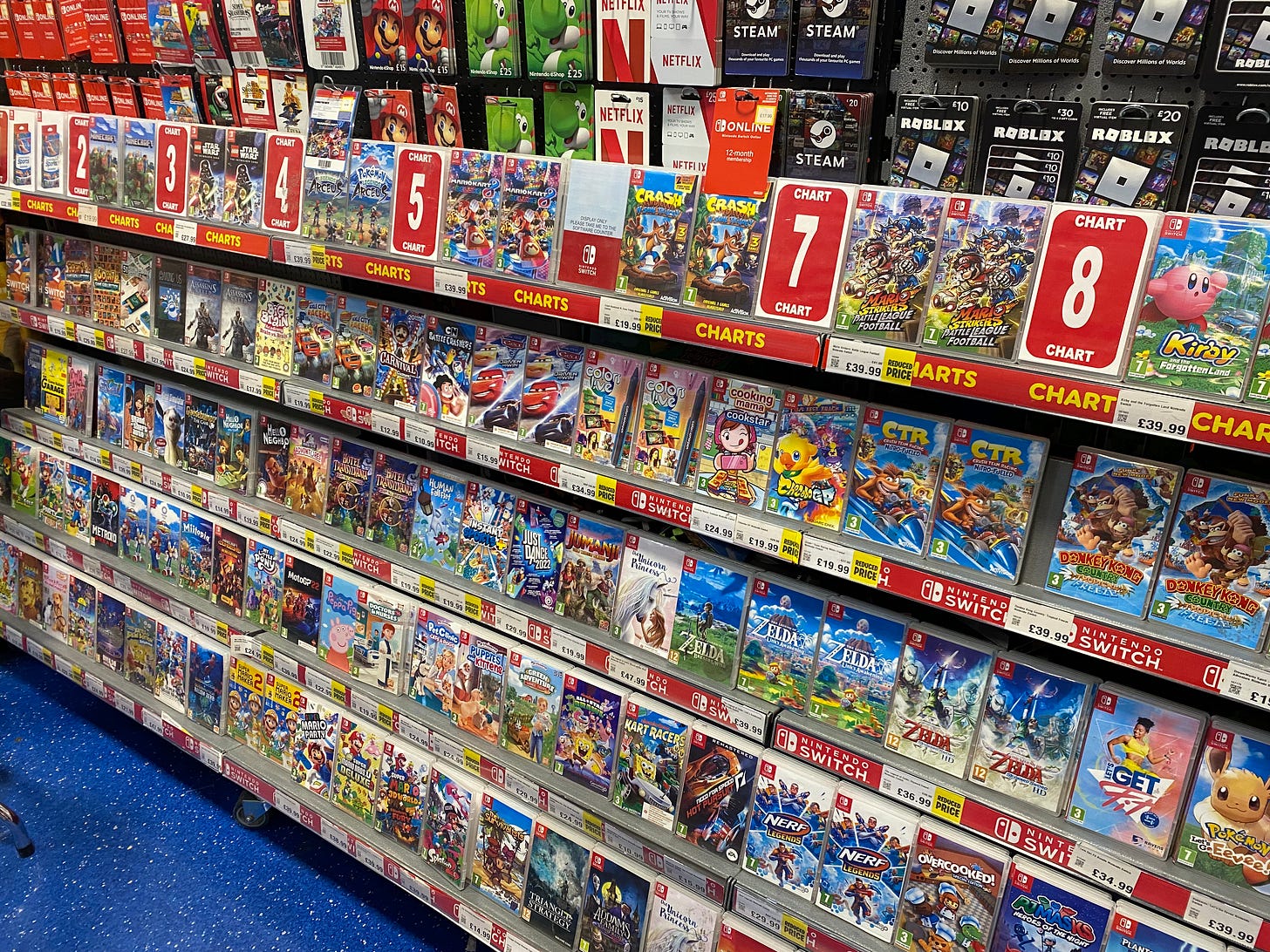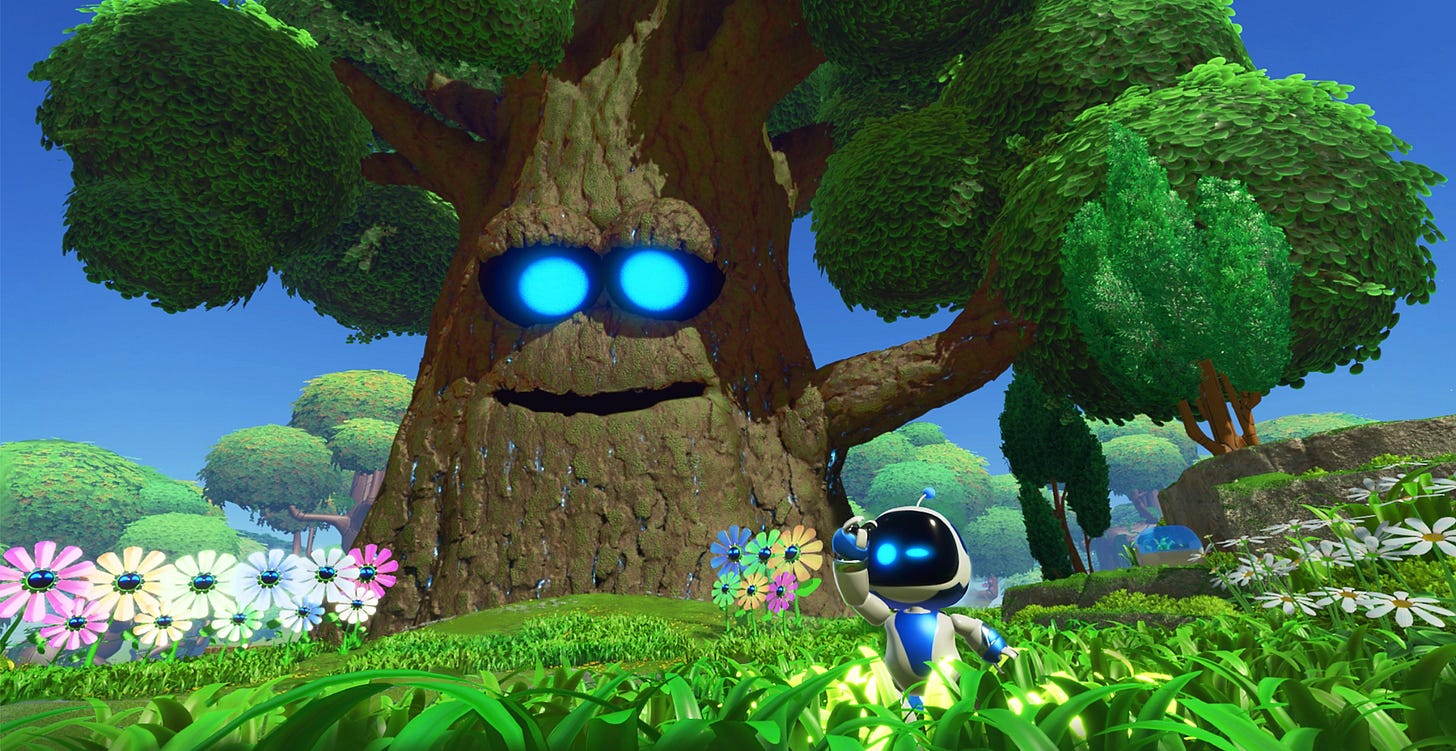Listen now on Apple, Spotify or YouTube
In This Edition
- The real state of video games retail
- Why it still matters even in 2025
- The impact of Quebec’s tax break changes
- Our experience of Nintendo Switch 2
Hello there! How have you been? I’ve missed you.
It’s been a busy week over at TGB towers (oh I wish I had a tower). A combination of the BAFTAs, the tariff chaos and the Switch 2 reveal means I’ve found myself doing various media appearances on TV and radio. My mum was especially pleased to see me on the BBC six o’clock news “for a good reason”. Whatever that means.
I also checked out the excellent London Game Festival, which is where Tuesday’s episode was recorded. And then spent Friday playing Nintendo Switch 2. It’s been a thoroughly enjoyable seven days.
Anyway, today’s newsletter is all about the physical games market and why it remains vital even in 2025. Alternatively, you can listen or watch the Show, which covers that, plus tax breaks, tariffs and my thoughts on Nintendo Switch 2. Best of all? I’m joined by The Logic’s Brendan Sinclair, who you may remember as the former managing editor of GamesIndustry.biz. Plus, there’s also a brief appearance by Andy Robinson from Video Games Chronicle.
Enjoy!
This month, UK retailer GAME will close its HQ and warehouse and move into the offices of its parent company.
It’s an end of an era for the retail chain which has become unrecognisable in recent years. Closing hundreds of stores in exchange for concessions within a sports clothing chain, dropping pre-owned, and giving up a huge proportion of its shelf space to toys. A series of decisions largely forced upon it by its current owners at Frasers Group.
There was a time when this would have been a big story. There was a time when GAME was one of the most powerful video game companies in the country. But in the modern industry it’s barely a footnote. The retailer is simply one of the last bastions of a dying corner of the business.
Last year in the UK, unit sales of physical video games fell 26%, while revenue was down a startling 35% (GfK data). Across Europe, the physical games market dropped 22% (GSD data). Things haven’t improved so far in 2025, with UK sales of boxed games down 30% for the first quarter of the year. And that’s without factoring a fall in sales of video game consoles.
“Nintendo Switch has been the dominant player at physical retail. That means if Nintendo has a quiet year, which it did in 2024, then that will have a direct impact on the boxed game sector overall”
Considering those numbers, is writing about the physical games market even worth my time and analysis? Well, I think so. Because when you delve beneath those headline figures you’ll discover that the industry isn’t yet in the situation to leave boxed games behind.
Let’s look at the UK (which is where we have the most data). Boxed game sales are falling across all platforms. The number of boxed PS5 games fell by 800,000 year-on-year in 2024, the number of physical PS4 games fell by 600,000 and the number of boxed Xbox games fell by over 300,000. Yet the real killer was Nintendo Switch, which saw its number of physical games sold drop by 1.8 million (which is a bigger number than what PlayStation and Xbox dropped combined).
Nintendo Switch has been the dominant player at physical retail. Sales of new Switch games are still around 80% physical in Europe. That means if Nintendo has a quiet year, which it did in 2024, then that will have a direct impact on the boxed game sector overall.
There may have been fewer Switch games sold, but the platform remains as physical as it’s ever been. There wasn’t a huge shift in consumers moving away from physical toward digital in 2024 on Nintendo.
Things are different with PlayStation, however. Across Europe in 2023, 55% of games sold on PS5 were downloaded, whereas that number jumped to 64% in 2024 (we’re only counting games released digital and physically here, not digital-only releases).
But this is more to do with the types of games released. Some titles are just more digital than others. Online action shooter games tend to do extremely well via download stores. Last year’s Warhammer 40,000: Space Marine 2, for instance, saw over 80% of its UK sales come via digital stores. And Sony’s own Helldivers 2 was over 90% digital.
That’s different for single player, story-driven action games or family titles. Let’s take 2023, which had an abundance of these games. 45% of Hogwarts Legacy’s sales, 49% of Assassin’s Creed Mirage sales and 45% of Resident Evil 4 Remake sales were physical in the UK. Meanwhile, Spider-Man 2 was bought more via physical retailers than digital ones (54% physical), although that does include console bundles.
There were fewer big single-player and family games in 2024. But one of the bigger ones that did launch, Astro Bot on PlayStation 5, was 55% physical in the UK and nearly 60% physical across Europe.
In other words, that sharp decline in physical game sales is less to do with a shift towards digital, and more to do with the release schedule.
That’s not to say there hasn’t been some shift from physical to digital. If we look at the annual sports titles (where we can do like-for-like comparisons), EA Sports FC 25 was 62% digital in Europe, whereas the year before EA Sports FC 24 was 55% digital (which is by far the biggest shift we’ve seen). Last year’s F1 24 was 70% digital in Europe, whereas F1 23 was 69% digital. And WWE 2K24 in Europe was 64% digital, while WWE 2K23 was 61% digital (note: the newer games all sold fewer games than their predecessors). So, we are seeing digital take a larger market share, but it’s not quite as dramatic as the headline figures suggest.
Even so, the data shows that there are still games very reliant on the boxed market. Switch games, retro games, kids games, family games, narrative games on PlayStation… they still see a high proportion of their sales come from the traditional retail sector.
Most physical games are now sold online (80% of UK physical game sales were via ‘mail order’ retailers, GfK reveals). So although it is disappointing to see video games retreat from shopping malls and High Streets, the impact on the wider industry isn’t going to be significant. But the boxed market remains important even in 2025, and that’s potentially challenging. With a rapidly fading games retail market, and the threat of tariffs on physical goods, there will be some companies who will feel over-exposed by their reliance on the boxed market.
Indeed, it’s not unreasonable to suggest that Nintendo’s decision to make digital versions of its Switch 2 games cheaper than the physical ones is, in part, an effort to accelerate the digital transition on its next platform (although I am sure most of it is due to the cost of the cartridges). This is a decision, of course, that GAME MD Nick Arran told us two weeks ago was ‘a challenge’.
The difficult headlines around games retail may seem irrelevant in 2025. But we’re still talking hundreds of millions of game sales, it’s still a useful discoverability channel, you still can’t download a console or a headset or a controller, and for certain AAA titles, retail remains a significant proportion of their unit sales. Put simply, the video game industry is not yet ready to say goodbye to the box.
Meanwhile…
Brendan Sinclair over at The Logic in Canada has looked at the impact of tax break changes on Quebec-based game developers. The new rules mean that studios can claim back less money and even incentivizes higher-paid roles over junior positions. Local studios claim the changes have come at the worst time for video game companies, and disproportionately harm locally-owned businesses. We had Brendan on the podcast this week who shared his insight into the story.
The Video Games Industry Memo has delved into the row between the industry and the EU over new in-game currency rules put forward by the EU’s Consumer Protection Co-operation Network (CPC). The rules would see in-game currency treated as ‘digital representations’ of real-world money. It also stipulates developers can’t ‘only’ sell bundles of currency, and even forbids developers from tweaking the value of things in its games. The video game European trade bodies accuse the CPC of failing to engage with the industry on the new rules. Expect this one to rumble on.
Shuhei Yoshida’s extended retirement media tour continued this week, with the former PlayStation veteran commenting on the Nintendo Switch 2, suggesting the Mario company is “losing its identity”. The reason stems from the fact that Switch 2 is mostly just a better Switch 1, which is what every other company does and isn’t what we’ve come to expect from Nintendo. And I suppose he’s right… if you ignore the SNES, Game Boy Advance, GameCube and 3DS.
That’s it from me this week. I’ll be back after Easter with new interviews, insight and analysis. If you’d like to see me cover something in particular, please do drop me a line at chris@thegamebusiness.com.
















Share this post